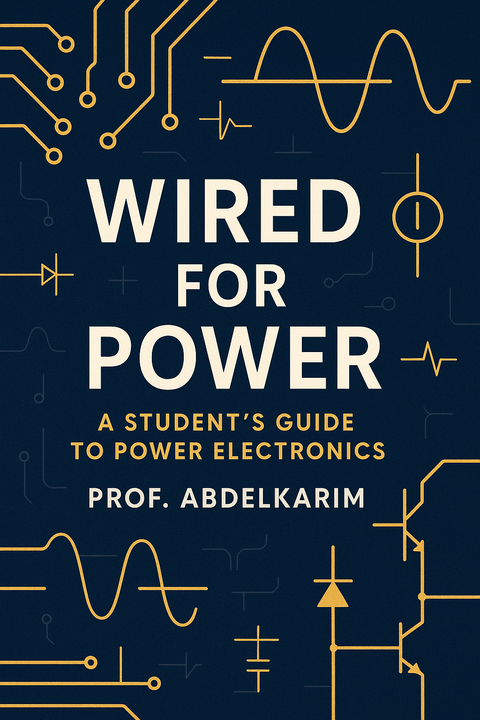
Wired for Power
A Student's Guide to Power Electronics
Included:
✓ 200+ Page AI-Generated Book
✓ ePub eBook File — read on Kindle & Apple Books
✓ PDF Print File (Easy Printing)
✓ Word DOCX File (Easy Editing)
✓ Hi-Res Print-Ready Book Cover (No Logo Watermark)
✓ Full Commercial Use Rights — keep 100% of royalties
✓ Publish under your own Author Name
✓ Sell on Amazon KDP, IngramSpark, Lulu, Blurb & Gumroad to millions of readers worldwide
Empowering Tomorrow's Engineers
Wired for Power is the essential companion for Polytechnic High College students delving into the multifaceted world of power electronics. The book examines the principles, applications, and innovations that drive modern power converting technologies, presented in a clear and engaging style tailored for students and aspiring engineers. This volume serves both as a foundational text and a practical handbook for real-world problem-solving in electronics.
Foundations and Deep Dives
The book opens with essential concepts, ensuring that readers develop a robust grasp of vital topics such as semiconductor devices, rectifiers, and power converters. Using illustrated examples and methodical explanations, it covers AC/DC conversions, switching circuits, filtering, and the intricacies of inverters and snubbers. Each chapter presents concepts contextually, weaving in industry practices and technological trends to keep students at the forefront of their field.
Extensively Researched, Student-Focused
Every chapter has been meticulously researched, providing the most up-to-date standards and methodologies in power electronics. The content is aligned with polytechnic curricula and includes references to both classic and current advancements. Practical problems, step-by-step solutions, and worked examples help demystify complex topics, while summaries and review questions reinforce student learning.
From Theory to Application
The book not only covers theoretical aspects but also emphasizes hands-on applications. Readers learn how power electronics underpin renewable energy systems, electric vehicles, industrial automation, and more. By connecting each topic to real-world systems, the book nurtures critical thinking and prepares students for internships, projects, and future careers in the field.
Your Bridge to Success
Whether you are building your first inverter or analyzing industrial converters, Wired for Power equips you with both knowledge and confidence. The author guides readers through troubleshooting, process optimization, and best practices in design and maintenance. By addressing common challenges and presenting new perspectives, this book becomes a trusted resource for both coursework and on-the-job reference.
Table of Contents
1. Introduction to Power Electronics- What is Power Electronics?
- Historical Perspectives
- Current Industry Trends
2. Semiconductor Devices
- Diodes and Rectifiers
- Transistors in Power Circuits
- Switching Devices Overview
3. AC-DC Conversion
- Principle of Rectification
- Full-Wave vs Half-Wave
- Controlled Rectifiers
4. DC-DC Conversion
- Buck and Boost Converters
- Design Considerations
- Applications in Industry
5. DC-AC Inverters
- Inverter Fundamentals
- Single-Phase and Three-Phase Inverters
- Modulation Techniques
6. AC-AC Conversion
- Line Commutated Converters
- Cycloconverters
- Applications of AC-AC Conversion
7. Switching and Control Strategies
- PWM (Pulse-width Modulation)
- Snubber Circuits
- Gate Drive Circuits
8. Thermal Management
- Heat Production in Power Devices
- Cooling Techniques
- Thermal Protection Methods
9. Passive Components
- Capacitors and Inductors
- Transformers
- Filters and Noise Management
10. Power Electronics in Renewable Energy
- Solar and Wind Systems
- Grid-Tied Inverter Design
- Battery Management
11. Troubleshooting and Maintenance
- Diagnostics Tools
- Common Faults and Solutions
- Preventive Maintenance Techniques
12. Future Trends and Innovations
- Smart Power Electronics
- Wide Bandgap Semiconductors
- Integration with IoT
Target Audience
This book is written for Polytechnic High College students studying electronics engineering, especially those seeking practical knowledge and hands-on applications in power electronics.
Key Takeaways
- Fundamental principles of power electronics and semiconductor devices.
- How to analyze, design, and troubleshoot basic power converters.
- Understanding AC-DC, DC-DC, and AC-AC conversion techniques.
- Application of power electronics in renewable energy and modern industry.
- Best practices for circuit design, thermal management, and safety.
- Insights into future trends and technologies shaping power electronics.
- Problem-solving using industry-standard tools and methods.
